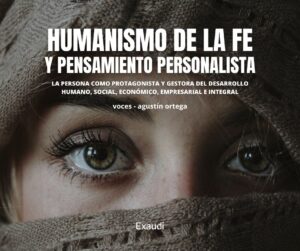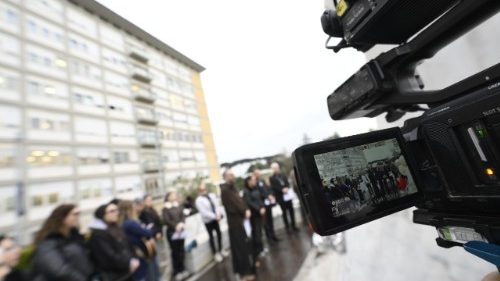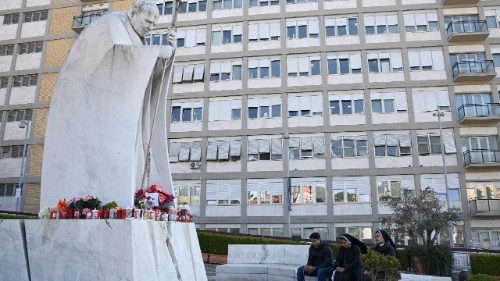Humanism of faith and integral personalist and Hispanic American thought
The person as protagonist and manager of human, social, economic, business and integral development

As we try to show in our teaching and university research, the faith and church with the Second Vatican Council united with the Popes such as Saint John Paul II and Benedict XVI, together with Francis, tell us everything valuable about philosophical currents and contemporary thought such as personalism. This has been highlighted again by the recent publication of the Dicastery for the Doctrine of the Faith, Dignitas infinite (DI) on human dignity in the line of the teaching of Francis such as Fratelli tutti (FT) or Laudato si’ (LS), pointing out the significant contribution of these relevant authors with a personalist orientation (DI 13). This personalistic thought connects with Hispanic America, as has been studied, integrating into a renewed spiritual and integral humanism inspired by faith.
As is known K. Wojtyla, the future Saint John Paul II, was one of the authors who contributed to developing and promoting personalism, as reflected in his maturity and splendor with his teaching as Pope. Continuing the conciliar event, especially its Pastoral Constitution Gaudium et Spes (GS), already from its programmatic Encyclical Letter Redemptor Hominis (RH), shows in a very profound way this whole worldview and personalist anthropology with its humanistic, ethical, critical, and theological sense. . And it is “that, in reality, that profound stupor regarding the value and dignity of man is called the Gospel, Good News. It is also called Christianity” (RH 10). These humanist and personalist horizons with their morals, which defend the sacred and inviolable life and dignity of the human being with their protagonism in the socio-historical reality, are reaffirmed in Veritatis splendor (VS) and Evangelium vitae. Making it clear how every social and international relationship, law or structure must be based on the “respect due to the human person” (VS 80). Francis also teaches the “centrality and supreme value of the human person in all phases of his existence” (EG 224).
In RH, Saint John Paul II deepens the legacy of all this integral anthropological and humanist personalism, exposing those constitutive dimensions of the real and concrete human: the spiritual, the personal as a unique and unrepeatable subject, the corporal, the affective that is realized in the love of the Other, the relational, the moral, social and historical. “Man in the full truth of his existence, of his personal being and at the same time of his community and social being—in the field of his own family, in the field of society and in such diverse contexts, in the field of own nation, or people (and possibly even only the clan or tribe), in the scope of all humanity—this man is the first path that the Church must follow in the fulfillment of its mission, he is the first and fundamental path of the Church, the path traced by Christ himself, the path that immutably leads through the mystery of the Incarnation and Redemption” (RH 13-14).
Saint John Paul II in Fides et Ratio has insisted, since philosophy and anthropology, such as personalism, have been very necessary and indispensable rooted in metaphysics (FR 83-84). This metaphysical pillar, the first philosophy, enables the solid foundation of the truth and life of the human being with his morality, in openness to the sense of the transcendent and absolute (ultimate) of reality, the living and true God revealed in Jesus Christ. And, in the wake of tradition of the church with its Doctors like Aquinas, it clearly manifests the natural, moral and divine law: which makes us responsible for doing the most universal good and avoiding evil, the common good of all humanity; promote this life and dignity of every person, welcome and respect the human being’s own corporeality and integrity, promoting inherent sociability and solidarity in all areas of existence (VS 50-51). Therefore, all acts or actions that do not conform to this natural law, that do not protect said nature and life and integrity of the person, are “intrinsically evil” (“intrinsece malum”) (VS 80). In this wake of continuity with Saint John Paul II and Benedict XVI, Francis teaches the inescapable relevance of “human nature” with its natural, moral and spiritual law that communicates permanent ethical “truths” and “universal values.” “Moral norms that prohibit intrinsic evil, without privileges or exceptions for anyone” (FT 209), enabling the care of life and dignity, for a real integral ecology that implies all this authentic global bioethics (LS 122-123).
In this sense, as Benedict XI shows us in Caritas in veritate (CV), The Mystery of the Trinity of God sustains these metaphysics of the inherent correlations between persons, communities and peoples that are based on solidarity (CV 54). Both Saint John Paul II in Sollicitudo rei social (SRS) and Francis, following Vatican II (GS 24), have emphasized how the Trinitarian God is the core of these interrelationships of dignified life, of fraternity in solidarity and social and international justice with the others, with the poor and the victims (SR 40; LS 236-240; FT 85).
I once again make my own and propose to everyone some words from Saint John Paul II, whose forcefulness perhaps has not been noticed: God has given the earth to the entire human race so that it may sustain all its inhabitants, without excluding anyone or anything privilege none (CA 94) (FT 120). Hence, as personalism continues to show us along with this entire social and moral doctrine of faith and church with its anthropology, in social, economic and political life we must strive incessantly to favor a personalistic and communitarian cultural orientation, open to the transcendence of the planetary integration process (CV 42).
For this reason, the principle that must guide the economy, the universal destination of goods, natural and first right, has priority over property. In this way, the intrinsic solidarity and social nature that makes up property is made visible. Just as Saint John Paul II teaches (SRS 42) and Francis is currently highlighting (LS 93-95, FT 118). Likewise, in his encyclical Letter Laborem exercens (LE), Saint John Paul II prophetically and masterfully transmits to us with his teaching this personalism, which inspires social and moral thought. And in this direction, the faith and church, with its tradition and morals along with its social doctrine, has never held the right of property as absolute and untouchable. On the contrary, it has always understood it in the broader context of the common right of all to use the goods of the entire creation: the right to private property as subordinate, to the right to common use, to the universal destination of goods. 14).
The Gift (Grace) of being a person, in the image and likeness of the Trinitarian God, with this rationality (responsibility) of solidarity for the common good and justice with the poor, completely frees us from the idolatrizes of having, of possessing, of wealth. -being rich, of power and violence. Just as Saint John Paul II (SRS 28) and Francis (LS 48-52, FT 189) continue to transmit with a real personalistic accent and following the tradition of the church with the Holy Fathers, Doctors and other testimonies of the faith. It is the holiness and militant existence that is experienced in love, fraternity and solidarity with spiritual poverty, that is, sharing life, goods and action for justice with the poor and crucified of history (GS 69; SRS 31; FT 114-119).
From the legacy of Doctor “Humanitatis”, Saint John Paul II deepens the “personalist” argument (LE 15). The principle of human and decent work, which comes before capital, the key to moral and social life; with decent working conditions and essential rights such as a fair salary. Which inseparably involves the personalization and socialization of ownership, of the means of production themselves. A true ethic of the company as a human community, which establishes a credible corporate social responsibility, enabling the awareness of working on “something of one’s own.” That is, the person as the protagonist and manager of human, social, economic, business and comprehensive development.

HUMANISM OF FAITH
AND PERSONALIST THINKING
THE PERSON AS PROTAGONIST AND MANAGER OF DEVELOPMENT
HUMAN, SOCIAL, ECONOMIC, BUSINESS AND INTEGRAL
voices – agustin ortega
Related

Pope Francis spent a peaceful night
Exaudi Staff
02 March, 2025
1 min

Pope Francis has had a peaceful night
Exaudi Staff
25 February, 2025
1 min

What should the boyfriend or girlfriend I should find be like?
Patricia Jiménez Ramírez
24 February, 2025
4 min

The Pope spent a quiet night at Gemelli
Exaudi Staff
23 February, 2025
1 min
 (EN)
(EN)
 (ES)
(ES)
 (IT)
(IT)

